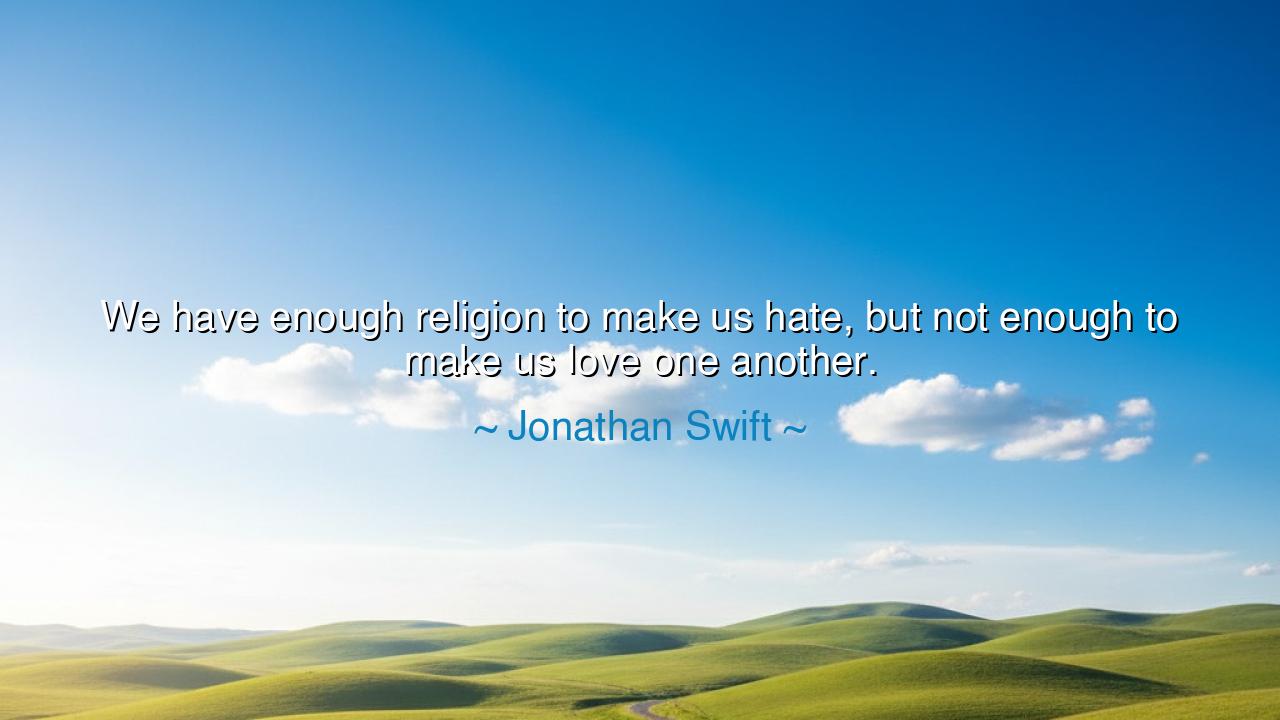
We have enough religion to make us hate, but not enough to make






In the sharp brilliance of his wit and the depth of his moral insight, Jonathan Swift — the great satirist and moral philosopher — once wrote: “We have enough religion to make us hate, but not enough to make us love one another.” These words, like a blade forged in both irony and sorrow, pierce through the hypocrisy of human faith. Swift, who lived amid the storms of religious division in 18th-century Ireland and England, saw with painful clarity how men, while claiming devotion to God, used religion as a weapon rather than a bridge. His quote is both a lament and a warning — that when faith is stripped of compassion, it ceases to be holy and becomes an instrument of cruelty.
The origin of this statement can be traced to the troubled religious climate of Swift’s own era. He was a clergyman of the Anglican Church, living in a time when Protestants, Catholics, and Dissenters waged wars not of swords alone, but of ideology and prejudice. Each faction claimed righteousness; each declared itself the guardian of divine truth. Yet Swift, from his pulpit and his pen, saw that the more people proclaimed their religion, the less they practiced its heart — love. He observed that religion, when divorced from humility and mercy, breeds pride, arrogance, and violence. Thus, he wrote these words as a mirror for mankind: to show that it is not the lack of faith that destroys us, but the corruption of it.
To say that we have enough religion to hate means that we have enough creed to divide — enough doctrine to label, to condemn, to claim superiority over others. Yet, as Swift lamented, we do not have enough religion to unite, to forgive, to embrace the shared spark of the divine in all souls. The religion of hate is loud, proud, and self-righteous; the religion of love is humble, silent, and self-giving. Swift’s words challenge us to look inward and ask: Is my faith a fire that warms, or a fire that burns? Do I follow the letter of belief, or the spirit of compassion?
History, alas, is filled with examples that prove his truth. Consider the Crusades, when armies bearing the Cross marched to reclaim holy lands, leaving behind rivers of blood. Or the Inquisition, where the Church sought to save souls by torturing bodies. In each case, men believed they were serving God — but in their zeal, they forgot that God is love. Even in modern times, we see religion wielded as a banner under which prejudice marches: faith used to divide nations, condemn minorities, or justify violence. Swift’s voice, though centuries old, still echoes across the ages, calling humanity back from fanaticism to the forgotten heart of belief — compassion.
Yet his words are not a rejection of religion itself; they are a plea for its purification. For Swift, religion is not the enemy — hypocrisy is. He believed that true faith, stripped of vanity and pride, is the only path that leads to peace. “Enough religion to hate” is religion that begins and ends with dogma; “enough to love” is religion that begins and ends with God. To live by love is to live by the essence of all great teachings — whether they come from Christ, Buddha, or any other prophet of compassion. Swift’s wisdom, though born of Christianity, belongs to all humanity.
The lesson, therefore, is both timeless and urgent: do not let your religion make you proud — let it make you kind. Let your creed be measured not by how well you argue, but by how deeply you love. If your faith separates you from others, it is not faith but fear. If it moves you to hatred, it has turned from heaven to shadow. The purpose of religion is not to create boundaries, but to dissolve them; not to elevate one soul above another, but to teach the sacred equality of all who live.
So, my children, hear the voice of Jonathan Swift across the centuries: seek a faith that softens the heart, not one that hardens it. When you pray, pray not only for your own peace, but for the peace of those you do not understand. When you serve, serve without judgment. When you love, love without condition. For the truest religion is not the one written in scripture, but the one written in deeds of mercy. And when humanity learns this — when we have as much religion to love as we have to hate — then, at last, we shall begin to see the face of the divine not in temples or in words, but in each other.






AAdministratorAdministrator
Welcome, honored guests. Please leave a comment, we will respond soon